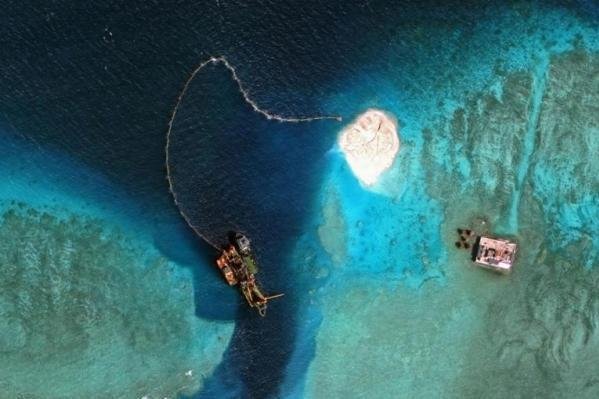A satellite image of Mischief Reef in the disputed Spratly Islands in the South China Sea. The Chinese foreign minister defended the construction Tuesday. File Photo courtesy of CSIS Asia Maritime Transparency Initiative / DigitalGlobe
BEIJING, March 8 (UPI) -- China's top diplomat suggested Japan's leaders are duplicitous in their relations with Beijing – a reference to several territorial and maritime disputes that continue to dog the two rivals.
"On one hand, the Japanese government leaders say nice things about wanting to improve relations, on the other they are making trouble for China at every turn," Chinese Foreign Minister Wang Yi said during the annual meeting of the National People's Congress. "This is what I would call a typical case of double dealing."
Territorial disputes and Japan's wartime legacy in China are the cause of tensions, and little has changed since 2012, the Japan Times reported.
That year, Tokyo purchased the disputed Senkaku Islands from a private citizen, riling China, which also lays claim to the territory.
Japan and China have also not resolved longstanding differences regarding Tokyo's wartime legacy, and Wang said Japan had "adopted the wrong approach to history."
On top of that, the two sides have been at odds over China's reclamation of islets in the South China Sea.
Although Tokyo is not a claimant to the Spratly Islands, also claimed by the Philippines, Taiwan and Vietnam, Japan has been vocal about denouncing the construction of airstrips and apparent military facilities on the reefs known as "Nansha" in China.
Wang has defended the construction and said, "In building defense facilities on our own islands and reefs, China is actually exercising the right to self-preservation and self-defense under international law."
Japan has been indirectly supporting one of the claimants, the Philippines, and recently provided war-fighting equipment, and even surveillance aircraft, to the Philippine military.
The New York Times reported the buildup is part of a long-term Chinese goal to establish a security buffer in the Western Pacific.
Beijing has claimed 80 percent of the South China Sea as its territorial waters.















